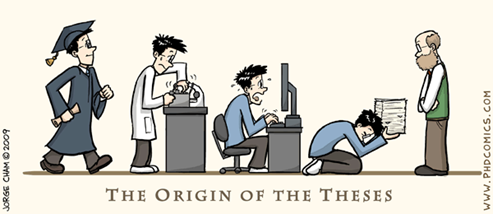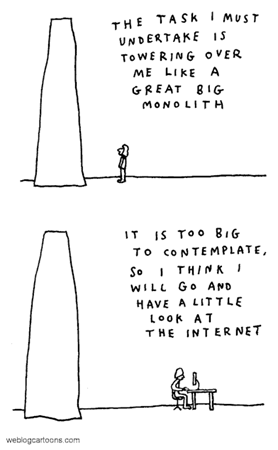September 2010
Monthly Archive
September 27, 2010
Posted by natswrite under
Life,
Literature,
school,
thoughts,
today | Tags:
academia,
academic writing,
college,
critics,
grad school,
literary theory,
musing,
research,
thoughts,
writing |
[2] Comments
 I always wonder about the authors of literary theory or criticism: who do they think they’re writing for?
I always wonder about the authors of literary theory or criticism: who do they think they’re writing for?
Unfortunately, in many cases the answer seems to be: themselves. Or rather, people exactly like them.
Fellows readers of academic writing, you know what this is like.
As required by my major and my department, I’ve read my share of literary theory; many of the “classics,” as it were. Pieces by Foucault, Bahktin, Greenblatt, Butler, Freud, Jung, countless others. (Don’t even get me started on the craziness of some: my critical theory grad seminar spent a whole class trying to picture exactly what the hell a rhizome is really supposed to look like; we ended up being someone around a garden potato.) And generally speaking, they are all pretty brilliant in one way or another – even if that way means you can only tell that at some point in life, the writer had a brilliant idea, and stopped there.
But there are some pieces that are so wrapped up in their own “brilliant” way of thinking, that you’re left with only two options: 1, that the work is so wonderful and smart that the only reason you can’t understand it is becasue you are not as wonderful and/or smart; and 2, that it’s a piece of crap, the author knows it’s a piece of crap, and therefore decides to write using the most-confusing logic available, that may/may not have made sense to them or their editor at some point.
[If you’re still following me after that paragraph, you must have been in this situation before.]

Which brings me to this question: Does critical work need to be complicated to be respected?
I’ve never had a teacher that didn’t want their students to write concisely, so where are these writers coming from? (I’m not sure where, but I’m sure you’re not supposed to ask.) Then again, I’ve had teachers comment that sometimes being too logical is a negative, making your argument too predictable.
I digress. But what causes this whole issue to pop up (yet again) was a book I’m reading for my thesis which cited a large paragraph of French without giving a translation.
I wonder: Is this inconsiderate of the author, or just an error on my part? Perhaps, in their mind, I am expected to be able to read Old English, Middle English, Latin, and French (and two out off the list just doesn’t cut it).
Yeah…..I’ll get back to them on that one.
September 23, 2010
Let me premise this entry with single most overwhelming statement being uttered on the interwebs right now: Facebook is Down.

[Does this mean college students all  across the globe are now being forced to …gasp… do work? *shutters*]
across the globe are now being forced to …gasp… do work? *shutters*]
I got to work this morning and promptly checked my email, only to see that a friend had written something begging a reply on my wall. And as I clicked to write on said post….nothingness. Thoughts flew through my mind, as if I was standing in line to buy something fantastic only to realize that I left my wallet at home. “But – but,” you say to yourself, “I wanted it!”
And my life has been thrown into a wacky off-kilter perspective.
It’s strange how something like a website can become so woven into our daily routine that we don’t even pay so much attention to it until it’s gone. It’s like (insert personal example here) the years before I realized I couldn’t eat bread: I hardly ever ate sandwiches but knowing I can’t eat one makes it evil incarnate.
And Facebook knows what it’s doing. If I were them, I would let the website crash ever now and then (DNS Server my ass) just so people appreciate it and realize that they can’t live without updating their statuses every 2 hours. The irony of course, being that an event like this is what most people would write about in their status updates. Genius.
I saw one new-site that said, ” You could go back to Myspace…yea right.” Seriously. There’s a monopoly in this world and we all live in it. (Except they’re not playing with paper money.)
[Note: Just as I was posting this, Facebook came back online. Damn. There goes my metaphor.]
September 1, 2010

Did you ever think about a project so much that it seems like it will never actually be realized?
I’ve officially begun the thesis, and by that I mean: I have my specific topic/claim, and it’s been declared “great” by my adviser. Hurrah!
I’ve been reading, thinking, doodling, brainstorming, fantasizing – but at this point, I haven’t actually started the writing… It’s so strange to think that within the next year I will have finished it, and finished my degree entirely. Done already??
I already miss regular seminars – does this mean I should keep going in school? Or will I always be one of those people who simply loves it. There’s a point in the lives of most adults, it seems, where you make the decision between getting a job and continuing to do the thing you never get sick of – and if you’re lucky enough those things coincide.

But the thesis. I’m beginning to think that it’s like that first plunge into cold water: you can slowly “adjust” yourself in all you want, but until you jump in and immerse yourself you will never really get used to your surroundings.
It all feels a bit like I’m back in elementary school, staring down the high dive, telling myself that walking down the stairs is not an option.

But the hardest part of any project, for me, is simply getting words on the paper. Ten pages of crap is better than zero pages of “great ideas,” in my opinion. Bring on the crap!
 But I’d like to see those smurfs…
But I’d like to see those smurfs…
 I always wonder about the authors of literary theory or criticism: who do they think they’re writing for?
I always wonder about the authors of literary theory or criticism: who do they think they’re writing for?






